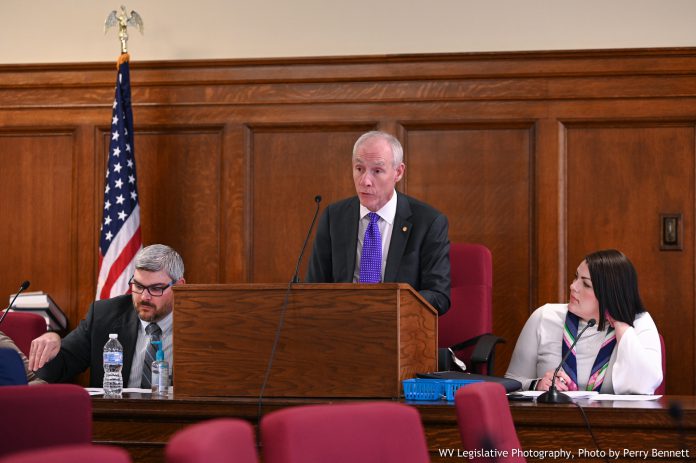The number of West Virginia high school and middle school students who report using vaping products has drastically increased in the last two years.
Catherine Slemp, commissioner and state health officer for the Bureau for Public Health, presented updated data on e-cigarette usage during Thursday afternoon’s Prevention and Treatment of Substance Abuse meeting.
Slemp cited newly-released data from the Department of Education, Centers of Disease Control and Prevention, and the Bureau for Public Health. Back in 2017, West Virginia was slightly above the national average for vaping, Slemp said.
“The last two years, that number has skyrocketed,” she told the committee. “It is increasing faster than the national average.”
Slemp said more than one in three West Virginia high school students reported using electronic vaping products and more than 60% of high school students have tried the products, which is up from 44.4% two years ago.
There were similar increases in middle schools, jumping from 5.9% in 2017 to 15.3% of middle schoolers in 2019 reported vaping. Slemp said one in six middle school students currently vape and the frequency of use has increased as well. High schoolers and middle schoolers typically got vaping products from a friend. However, Slemp said a troubling finding was that the third most common place teens get vaping products is from family members who think they are safer than cigarettes.
Vaping has predominantly increased among women; however, men report using vaping products more heavily, she said. Vaping is also more predominant among youth with cigarettes more common with adults.
Slemp told the committee there have been cases of West Virginians hospitalized from vaping-related injuries. However, these cases have been mostly from counterfeit products.
To address vaping and cigarette usage, Slemp said legislators should look at many different angles. She said tobacco products and e-cigarettes are taxed at different rates with cigarettes taxed at $1.20 per pack and e-cigarettes at 7.5 cents per milliliter.
For tobacco cessation, Slemp cited the tobacco settlement fund. Money was previously used from that fund to shore up the teachers retirement fund. However, the fund generates about $20 million a year in interest.
“More than $100 million is spent in industry advertising in West Virginia alone,” Slemp said.
Slemp recommended funding tobacco cessation and prevention funds at a higher level. Currently, efforts are funded at $500,000, she said.
“Tobacco is the single largest preventable cause of death in West Virginia,” she told the committee. “A third of cancers are attributed to tobacco. It drives health costs, insurance, and productivity losses.”
After the presentation, the committee advanced House Bill 4493, which would require mail carriers to check photo IDs when delivering tobacco, nicotine, or vapor products. Some delegates said they supported the bill but had privacy concerns. The bill now heads to the House Health and Human Resources Committee.

